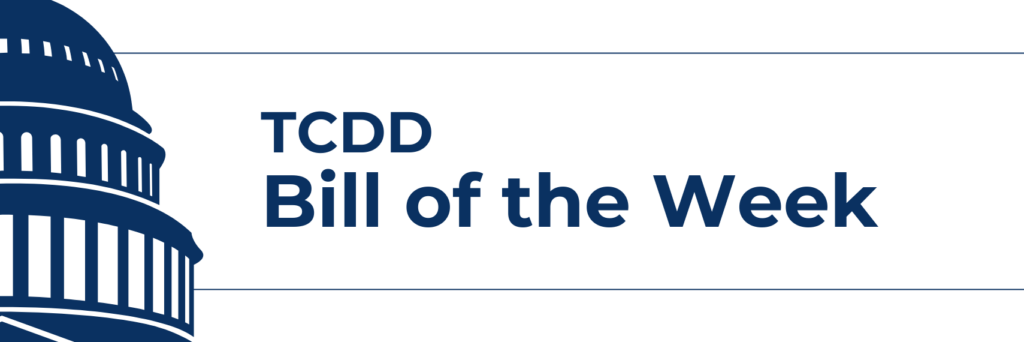
Table of Contents
For this weekly feature, the Texas Council for Developmental Disabilities (TCDD) profiles a noteworthy bill going through the legislative process. The bill may relate directly to TCDD’s Public Policy Priorities or another disability-related issue.
Bill of the Week: HB 1188
House Bill (HB) 1188, relating to the referral of certain students receiving special education services to a local intellectual and developmental disability authority (LIDDA) for services or public benefits. HB 1188 was authored by Rep. Christian Manuel, from Beaumont, House District 22.
Share This Bill
We’ve created a Bill of the Week one-pager (PDF, 335 KB) for HB 1188. This is a simplified explanation of the bill that you can share with your representative and personal network.
Background
Local intellectual and developmental disability authorities, also known as LIDDAs, serve as the point of entry for publicly funded intellectual and developmental disability (IDD) programs, according to the Texas Health and Human Services Commission. LIDDAs provide or contract to provide an array of services and supports for people with IDD, including:
- enrolling eligible individuals into the following Medicaid programs:
- Intermediate Care Facilities for Individuals with Intellectual Disabilities (ICF/IID), which include state-supported living centers
- Home and Community-based Services (HCS)
- Texas Home Living
- permanency planning for individuals under 22 who live in an ICF/IID, state-supported living center, or a residential setting of the HCS Program.
School districts provide information on LIDDAs to students receiving special education services. However, school districts are not required to do so until transition planning begins when the student turns 14, or when a child exits early childhood intervention.
Advocates suggest that information on LIDDAs should be provided to families much earlier, particularly due to the lengthy interest lists for Medicaid waiver programs which can result in an individual waiting over 15 years to receive vital services. By notifying families of the resources sooner, advocates argue that students with IDD can have a better quality of life, access employment assistance, and avoid institutionalization in facilities such as state hospitals, jails, or prisons.
What does the bill do?
HB 1188 would require school districts to refer each student receiving special education services who has or may have IDD to a LIDDA for services or public benefits, including services under Medicaid waiver programs.
If passed, HB 1188 would take effect on Sept. 1, 2025, and apply with the 2025-26 school year.

Where is the bill in the process?
On Nov. 12, 2024, HB 1188 was pre-filed for the 89th regular session. Since committee assignments have yet to be named, the bill is waiting to be referred.
Who supports the bill and why?
The following comments were provided at an April 18, 2023, public hearing on a bill identical to HB 1188:
- Family Member: Carey Handley, the mother of an individual with IDD, spoke on behalf of herself in support of the bill. Accompanied at the hearing by her husband and daughter, she discussed how her daughter was diagnosed at the age of two, but they did not become aware of the waiver programs until she was 14. At the time of the hearing, her daughter was 29 and had been on the waiting list for services for 15 years with no end in sight. In that time, they have attended numerous resource fairs and found that many families were similarly unaware of the waivers or the long wait times. Her family suggested the legislation to The Arc of Texas to provide the opportunity for families to access and benefit from these services sooner.
- The Arc of Texas: Ashley Ford, who at the time was the director of public policy and advocacy for The Arc of Texas, provided testimony in support of the bill. She indicated that she has phone conversations regularly with families who are shocked to find out that they had never heard about a LIDDA before their call. She stated, “Unfortunately, families are finding out about the existence of LIDDAs and the public services and benefits that they can get in contact with if they are referred to a LIDDA way too late. And so this bill is not requiring anybody receive services or benefits, it’s just requiring that we have a greater awareness among public school children who have an intellectual or developmental disability.”
- Texas Council for Community Centers: Isabel Casas, then speaking as the government relations director of IDD services for the Texas Council for Community Centers, testified in favor of the bill. She indicated that, as the association that represents the state’s 39 LIDDAs serving all 254 counties in Texas, they supported the bill “as a means to ensure families of children with IDD are connected as early as possible to information about IDD services.” She further detailed the list of resources that are provided by LIDDAs, functions that require highly educated, experienced staff as well as licensed professionals for certain assessments and providing expert assistance. With this in mind, and recognizing that implementation of the bill could be expected to result in more referrals to the LIDDAs, she hoped that lawmakers would “support appropriating additional funds in the final budget for increases to safety net services that are provided by the LIDDAs and also to support the local authority workforce investment.”
The following groups registered in support of the bill: Autism Speaks, Clarity Child Guidance Center, Disability Rights Texas, Girls Empowerment Network, National Association of Social Workers, Texas Association of School Psychologists, Texas Catholic Conference of Bishops, Texas Council of Administrators of Special Education (TCASE), Texas Parent to Parent, Texas PTA, Texas Public Charter Schools Association, United Ways of Texas, and others.
Who opposes the bill and why?
At the 2023 hearing, one individual registered opposition but provided no testimony or indication as to their concerns with the bill.
How much will the bill cost?
The Legislative Budget Board found that a bill identical to HB 1188 would not impact the state budget in a significant way.
Is there a Senate companion to the bill?
There is no Senate companion to HB 1188.
Stay Informed
For the latest information about where HB 1188 is in the process, follow the bill on the Texas Legislature Online. To receive future legislative updates from TCDD, follow us on Facebook, X, Instagram, and LinkedIn.
